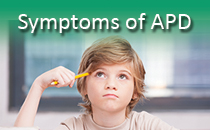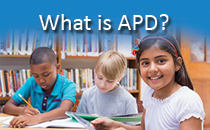Auditory Processing Disorder is actually an umbrella term that describes various subtypes that affect how the brain perceives and processes what the ears hear. Since there are different types of APD, symptoms will vary from child to child. While no two people with APD are alike, these individuals all have various challenges with everyday listening due to problems in the accurate and efficient processing of auditory information.

Common Symptoms of APD
- Frequently requesting repetition and/or rephrasing of information, saying “what” or “huh” often
- Difficulty understanding speech with competing talkers or background noise
- Difficulty following multiple-step or lengthy oral instructions
- Mishearing auditory information
- Slowness in processing and responding to auditory information
- Distracted by background noise, often sensitive to soft sounds in the environment most people do not notice
- Overwhelmed by complex or noisy auditory environments (i.e. classrooms, parties, shopping malls)
- Difficulty maintaining attention when listening to verbal information
- Inconsistent or inappropriate responses to spoken requests for information
- Misinterpretation of questions
- Difficulty remembering spoken information
- Difficulty following classroom discussions, or making off-topic contributions
- Trouble hearing the differences between sounds in words
- Difficulty hearing when a signal is not clear or is ‘degraded’ (i.e soft, rapid, or distorted speech, accented speech, speech in reverberant environments, and speech over the phone)
- Poor memory for lists of words and numbers
- Trouble focusing when conversations or activities do not include visuals
- Difficulty with complex language such as word problems
- Poor phonological awareness skills such as sound-symbol relationships, blending a sequence of sounds into words, and identifying the beginning, middle, and ending sounds of words
- Poor reading fluency and/or reading comprehension
- Poor spelling skills, with better performance when quizzed one-on-one
- Difficulty interpreting prosody and tone of voice cues that underlie emotion, humor, and sarcasm and may be likely to interpret messages literally or get feelings hurt easily
- Articulation errors that persist longer than they should
- Difficulty finding the right words to use
- Difficulty singing in tune and poor musical ability
- Preference for loud television volume
- Listening fatigue
- Become frustrated with certain tasks. (i.e. saying “I don’t understand” or “I don’t know what you mean”)
For symptoms for a specific age group links are provided below:
Preschool & Kindergarten Children
Elementary School Children
Teenagers
College Age / Young Adults
Adults




